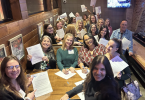Millennial PR pros are heading into higher levels of leadership. They are taking on more responsibility and managing the next generation of new professionals. Moving from tactical positions to more strategic roles is a significant milestone, but are they equipped to recognize and manage the ethical challenges they will face?
What do they know?
This question was the focus of a September 2016 study sponsored by Arthur W. Page Center and the PRSA Board of Ethics & Professional Standards (BEPS). The data, which is published in the Public Relations Review, was collected via a survey distributed to approximately 1,500 members of the New Professionals section as well as members who have less than five years of experience in public relations. The 19% who responded indicated:
- They do not feel prepared to provide ethics counsel.
- Those who were aware of and likely to use PRSA/PRSSA ethics resources and training did feel more prepared and were more likely to believe that ethics counsel is public relations’ responsibility.
- Only one-third indicated they felt prepared to offer ethics counsel.
- Only 41 percent said they were familiar with PRSA’s Code of Ethics
- Less than half of the respondents said they were likely to consult the Code of Ethics.
How did this happen and what can we do?
These statistics stand in stark contrast to results from a survey conducted with the general PRSA membership the year before when 72 percent indicated they were familiar with the Code of Ethics. One possible explanation for the differences in awareness could be that many of the newest members of PRSA were not members of PRSSA and are just beginning to learn about PRSA’s ethics resources. Survey respondents indicated they were open and receptive to additional information, indicating an area of opportunity for PRSA to expand its outreach and professional development resources targeted to new professionals, including blog posts and Twitter chats.
This past year, PRSA’s Board of Ethics and Professional Standards (as a part of Ethics Month) held a Twitter chat with the New Professionals section, as well as with various PRSSA chapters around the country.
The study also provided evidence that mentors also can make a positive difference. Millennials who felt comfortable discussing ethical concerns with mentors were more likely to raise ethical concerns. Many PRSA chapters have mentoring programs for younger members and the College of Fellows also provides mentoring opportunities. Chapters who do not have a mentoring program may benefit from building stronger partnerships with PRSSA chapters and partnering senior members with new professionals.
This potential advantage is bolstered by the September survey and one conducted by BEPS over the last year, which imply that confidence and preparedness come with more experience in public relations as well as increased awareness of industry standards regarding ethical practices. When senior-level professionals share their experiences with new professionals, we are likely to see an increase in awareness, and hopefully a decrease in ethical lapses in our industry.
What’s next?
As a follow-up to these studies, BEPS is conducting research with the College of Fellows regarding effective techniques for raising ethical concerns. This research will lead to instructional materials for educators and PRSA members by this Fall based on insights.
By Marlene S. Neill, Baylor University, & Nancy Weaver, The Cosmopolitan of Las Vegas.








I have been teaching ethics at Syracuse University’s Newhouse School for the past several years. While I know each professor rightfully believes with conviction that THEIR course is the most important, I can certainly say that teaching ethics in a public relations/communications school is ONE of the most important courses.
And I am continually encouraged by the level of thoughtfulness and discourse that our students engage in with regard to this topic. They take it seriously – and they consider it carefully.
In fact, I believe the future is in good hands with our students. I hope our efforts at Newhouse play at least a small role in helping them prepare for that future.
The ability to counsel on ethics starts with a moral compass, deeply and broadly accentuated by experience and time in the field. APR is helpful and recognition of yeoman skills but time in the job is essential.
As a University student, I find this data to be very shocking. Throughout my strategic communication classes, most, if not all, my professors have mentioned the PRSA code of ethics. In fact, I have even completed multiple assignments covering this topic. I am curious as to why so many young professionals in the field are unaware of the code. It makes me wonder if I will soon forget all I’ve learned about the code. Is this an issue with the education we received, are PR students failing to join a PRSSA chapter, or are the PRSSA chapter’s failing to prepare future professionals?
As a millennial, I do think it is alarming that a significantly low percentage of new PR professionals know about the PRSA code of ethics and would turn to it if they needed ethical guidance. However, I do not feel that this means millennials are less equip to handle ethical situations. In fact, I believe we have a greater understanding of the responsibilities held with respect towards digital and social media. If the industry wishes for the younger generation to increase their knowledge of the set PRSA Code of Ethics, then is the responsibility of those who have practiced following the code to educate the younger generation
Being one of the Millennials, I feel I am not ready too. Being under PR field for only less than two years, I still need a lot of training. However, I am eager to learn more about PR and code of ethics. I agree that while gaining more experience in the future, one can be more confident and have have more awareness.
We appreciate all the comments. The PRSA Board of Ethics & Professional Standards plans to collaborate with the New Pros section to address some of the issues raised in this study. We will be scheduling some webinars soon. We have a third study underway now and will be developing some teaching resources and other educational materials for students and young professionals.
At first, the title of this article confused me. What makes millennials inherently less ethical? I would completely agree that more experience with difficult PR ethical dilemmas would make for a more qualified PR practitioner.
However, a more fitting article title would replace “millennials” with “new PR practitioners”. The characteristics that are dealt with in this article are entirely based on experience and not age group. The article implies that all PR professionals born after 1980 (millennials) as inexperienced and not-equipped for handling ethical dilemmas.
I agree with Eva’s comment above. Millennials, in general, are valuable assets for dealing with the implications of social media.
When referring to millennials and their unwillingness to conform with the ethical manner of the public relations profession, I have to respectfully disagree. As a soon-to-be senior at Western Kentucky University, majoring in public relations, I am continually encouraged by my peers and the profound level of ethical consideration they put into every step of their academic career.
I can only envision that this passion will grow with time and experience in the field. After all, ethics at its root is not necessarily taught through textbook examples. Rather, it is instilled through worldly combat. It is now, within our heightened 21st century consciousness that millennials are more awakened than any generation that came before.
I really enjoyed this article and its emphasis on mentorship. I believe it’s crucial for the industry to embrace the idea of passing down knowledge and experiences to raise up future PR leaders. We too commonly forget that we are united under a common banner of advocacy for others.
[…] http://prsay.prsa.org/2017/03/01/are-millennials-equipped-to-be-ethical-pr-leaders/ […]